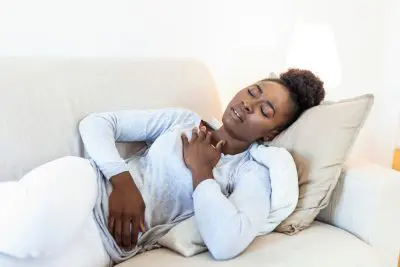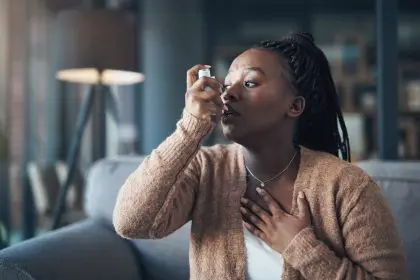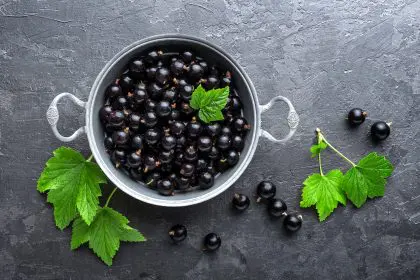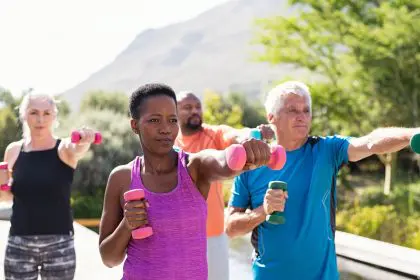Rolling out‘s Health IQ proudly presents an enlightening conversation with Kenyatta W. Stephens, Ph.D., an internationally recognized public health strategist and founder of SAPHE Consulting Group. With a background in molecular biology and extensive experience in disease surveillance and epidemic management, Stephens is a leader in modernizing public health infrastructure through technology and data analysis.
In this edition, we address critical issues surrounding COVID-19, the importance of vaccinations, and essential health protocols for our community. Stephens provides valuable insights into the ongoing impact of COVID-19, including the new Flurt strain, and offers practical advice on protecting ourselves and our loved ones. Join us to learn how to navigate this health crisis.
Munson Steed: Hey, everybody! This is Munson Steed, and welcome to another edition of Health IQ. There are individuals in our community who truly serve to increase our IQ about our health and to increase our understanding about the truth, so that we can have trusted resources, trusted Ph.D.s from all those great intellectuals inside our community. We want to shine a light on one of my faves of all time. Obviously, HBCU graduate, clearly has her Ph.D., Dr. Kenyatta Stephens, how are you?
Dr. Kenyatta W. Stephens: I’m well, Mr. Munson Steed, how are you?
MS: Fantastic. It is the summertime, and we clearly, as a community, have underestimated the presence and the continued attack on our community as it relates to COVID. What should we know about COVID right now, and how many people are dying from COVID annually in a very quiet moment?
KWS: So, yes, COVID is on the rise this summer, and there’s a new strain that scientists have termed the Flurt strain. It’s a silent attacker, as COVID has been in the past, and there has been a 13% rise in COVID deaths just this summer. Quiet as it’s kept, hospitals are being overwhelmed with COVID patients. Some of them have even begun to implement COVID floors again. While the public is seemingly COVID tired, COVID hasn’t gone anywhere. Unfortunately, what most people don’t realize is that the more times you contract COVID, the more likely you are to get long COVID, which means the symptoms never leave. We have patients who have had the continuing effects of COVID since they first contracted it in 2020. Over the years, long COVID has been an issue, so much so that we do have ICD-10 codes for it now. This allows patients to have insurance coverage for their symptoms. It’s still being researched, and there’s still not a lot known about long COVID. It’s important to know because I always get the question, “Well, how can I prevent myself from getting long COVID?” The answer is by reducing the number of times that you actually get COVID.
MS: Thanks for that. Some individuals know they have pre-existing conditions and are not vaccinated. People with diabetes, people with asthma, people with heart issues, smokers. What should they know about getting vaccinated if they have pre-existing conditions?
KWS: Yes, for those who have those pre-existing conditions or comorbidities, they definitely need to stay vaccinated, as their immune systems may not be as robust. I’ve attended quite a few conferences this summer over the past few weeks, and there have been COVID outbreaks. While some have pretty much knocked the person on their butt, there are some who say, “Well, I didn’t have any symptoms. I was feeling fine, but I tested positive.” And there are those who say, “I feel fine. I’m not gonna test.” My concern and my urge and push for them is to still get tested just because you’re feeling fine. You may be younger and have a robust immune system. There are those out there with chronic diabetes and other chronic illnesses that may not be able to ward off such an infection as quickly and may end up in the hospital, or even, unfortunately, with long COVID. That has always been my push with everyone who has potential exposure or who has been in a crowd to definitely get tested. Even if you don’t feel well, this particular strain of COVID can look like stomach flu or food poisoning. Most people just chop it up to, “Oh, I ate something bad,” but it’s actually COVID, and then they’ve gone out and infected countless others. Unfortunately, some of those in that number are those who don’t have robust immune systems to be able to protect themselves and not end up hospitalized.
MS: Have we forgotten many of the protocols? We used to have distancing. What would you say to a person like yourself who is going to a conference? Should you test before returning home? Should you still test before you go to visit a senior loved one or somebody you know has diabetes? What protocols do we need to follow just to be a conscientious community?
KWS: So for me, if y’all see a lady in the airports throughout the nation with a mask on, it’s probably me. I stay masked up on planes even out of this “quote-unquote” pandemic. It’s something that I actually did as an infectious disease epidemiologist before the pandemic hit. I would always have a face covering when I flew. I did a lot of international travel, but just knowing how germs spread, especially with the recirculated air, that was one thing I’ve always been cautious of. To that point, I do have a couple of friends who have never had COVID, and that’s something I intend to maintain. But definitely, if you’re traveling a lot, and if you’re in crowded spaces like airports or airplanes, definitely wear a face covering or a mask. Wash your hands often. If you’re touching things at the airport, I’m always the person cleaning my space. Once I’ve left the airport and I’m getting in a car service, I’m always wiping things down because there are others who aren’t as attentive to hygiene. It’s not just COVID, but there’s been an increase in flu infections and other respiratory disorders this summer that can actually lead to hospitalization. So definitely, mask, face coverings, frequent hand washing, and also distancing, especially if you have some of these pre-existing conditions, such as chronic illnesses like diabetes, heart disease, high cholesterol, things that will make fighting off any type of infection challenging. For me, with these conferences, I was just at a very large conference in Dallas, and people were like, “Oh, let’s go to the middle, let’s sit at the front,” and I’m like, “No, I always sit in the back of the room.” If I go to a brunch with 1,000 people, I’m at the back of the room because the airflow at the back of the room is a little bit better versus being compressed in the center with everybody converging and breathing on each other all at once. Luckily, I know people that came back positive with COVID. No one in my crew because they know I’m like, “OK, here’s some hand wipes, here’s some hand sanitizer, go wash your hands.” We wore masks when there wasn’t that proper airflow and distancing that could be achieved. Those are just some of the things that we’ve done before that we need to be more aware of and reimplement.
MS: Many have not gotten their annual checkup to actually see if they have any health issues or have put it off since 2020. They just haven’t got back to it. What do we need to kind of do as a checklist to kind of say, “Hey, I’m heading into the fall. Maybe this is my moment to prepare myself, not just the house, but prepare myself for the fall.”
KWS: Well, as adults, we kind of put immunizations in the back of our minds. We tend to think that it’s something just for children. My recommendation is that as you’re preparing your children to receive shots to go back to school, you get your boosters as well. There have been some outbreaks of hepatitis B and tetanus. If you’ve been exposed, just visit your doctor. When you make the appointment for your child, make the appointment for yourself, and then determine which boosters you may need as well, especially if it’s been 10 years.
MS: How do we increase our understanding that COVID is not over, it’s still here. So bumping elbows with people when you’re at a conference, not hugging, should still be in practice.
KWS: Yes, and also the personal responsibility of if you’re not feeling well, stay home. I think we’ve lost that. There’s also the mental health aspect of COVID and the reminders. Some people are still affected, and so they’re kind of over-social right now, and that’s the challenge. It’s okay to dap somebody or just to wave. With some of the organizations that I’m in, and that we were having these conferences, I made sure to tell those like, just kind of be aware of who’s around you. Look for people who may appear ill but are still pushing through. In the Black community, especially with Black women, we just kind of push through tiredness and illness to just, “quote-unquote” get the job done, and that’s detrimental to our bodies in the long run, making us more susceptible to disease. There are some studies that have shown that the silent stress, the stress that Black women don’t express, is slowly killing them and making us sick. So definitely, if you’re not feeling well, men and women, it’s OK to stay home. People will understand. I would rather someone who is unsure whether it’s a cold, flu, COVID, or what, just stay home to avoid infecting someone else, because even the flu can kill. Flu deaths are particularly high, and we’re beginning to embark upon flu season as well in September, but we’re seeing it earlier, like coming up in August and toward the end of this month. So definitely, get your shots, especially if you know you have these chronic issues. Please, please, please go and get your annual checkups. I know the whole premise, especially in the Black community, is “What I don’t know can’t hurt me,” but it can kill you. So with that in mind, go see your doctor, stay on top of your illnesses or your chronic conditions, and definitely get active because that’s one of the key things. Just walking daily can help improve your immune response to disease and improve lung capacity.
MS: Thank you so much, Dr. Stephens. You’re always on top of it. For all of us out there, know that Health IQ and Dr. Stephens, follow her on IG. There’s a true need for us as a community to come together to educate our community, share the knowledge that Dr. Stephens has shared to make a difference in how our health outcomes are affected by us sharing positive information and healing our community in advance of any illness. I’m Munson Steed, and you’re watching Health IQ with Dr. Kenyatta Stephens. Thank you so much, Dr. Stephens.
KWS: Thank you.
For more insights and updates from Kenyatta W. Stephens, follow her on Instagram at @sapheconsultinggroup and @drkwstep, and connect with her on LinkedIn at Kenyatta W. Stephens.
Editor’s note: This is an extended interview, errors will occur.













